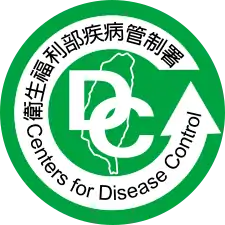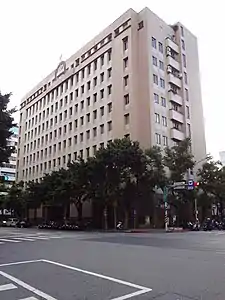Taiwan Centers for Disease Control
The Taiwan Centers for Disease Control (CDC; traditional Chinese: 衛生福利部疾病管制署; simplified Chinese: 卫生福利部疾病管制署; pinyin: Wèishēng Fúlì Bù Jíbìng Guǎnzhì Shǔ; Pe̍h-ōe-jī: Ōe-seng Hok-lī Pō͘ Chi̍t-pēⁿ Koán-chè Sú) is the agency of the Ministry of Health and Welfare of Republic of China (Taiwan) that combats the threat of communicable diseases.
| 疾病管制署 Jíbìng Guǎnzhì Shǔ | |
 | |
 | |
| Agency overview | |
|---|---|
| Formed | 1 July 1999 |
| Jurisdiction | Taiwan |
| Headquarters | Zhongzheng, Taipei, Taiwan |
| Agency executive |
|
| Parent agency | Ministry of Health and Welfare |
| Website | Official website |
Central Epidemic Command Center (CECC)
The Central Epidemic Command Center, division of the National Health Command Center, is activated by the government of Taiwan for several disease outbreaks, as the 2009 swine flu pandemic[1] and the COVID-19 pandemic.
The CECC has the authority to coordinate works across government departments and enlist additional personnel during an emergency.[2]
History
The agency was established on 1 July 1999.[3]
Timeline of early warning for COVID-19
TCDC officials saw premonitions of the COVID-19 pandemic in December on social media. As well, medical staff freely transit the Taiwan Strait, so the TCDC was dimly aware that something was awry in December. On 31 December, Wuhan city government stamped paper that required doctors in the city to report all cases of a novel pneumonia to them. On 1 January, the Huanan Seafood City market (HSCM) was shuttered by the health authorities.[4]
By 5 January 2020, the Taiwan CDC began monitoring all individuals who had travelled to Wuhan within fourteen days and exhibited a fever or symptoms of upper respiratory tract infections. These people were screened for 26 known pathogens, including SARS and Middle East respiratory syndrome, and those testing positive were quarantined.[5]
Chuang Yin-ching recounted that "TCDC made a request to the Chinese health authority on 6 January. I was notified on 11 January. I remember that day very clearly because that was the Taiwan presidential election day. Around 6 pm in the afternoon I got a phone call from the director general of the Taiwan CDC that (I and a colleague) had permission to go to Wuhan. We flew there the next night for a meeting on 13 and 14 January morning and afternoon in Wuhan."[4]
On 15 January, Chuang and his colleague were summoned to the Director-General of the TCDC. The next morning he was present at the expert task force meeting. This was followed by a press conference on 16 January.[4]
Notable personnel
- Chuang Yin-ching, commander of the Communicable Disease Control Medical Network
- Ih-Jen Su, director-general (2003–2005)
- Twu Shiing-jer, director-general (2000–2002)
Organizational structure
- Information Management Office
- Secretariat
- Personnel Office
- Civil Service Ethics Office
- Accounting and Statistics Office
Divisions
- Division of Planning and Coordination
- Division of Infection Control and Biosafety
- Division of Acute Infectious Diseases
- Division of Chronic Infectious Diseases
- Division of Preparedness and Emerging Infectious Diseases
- Division of Quarantine
- Epidemic Intelligence Center
- Center for Diagnostics and Vaccine Development
Centers
- Taipei Regional Center
- Northern Regional Center
- Central Regional Center
- Eastern Regional Center
- Southern Regional Center
- Kaohsiung-Pingtung Regional Center[8]
Transportation
The headquarter center is accessible and within walking distance south of Shandao Temple Station of Taipei Metro.
Methadone program
The agency subsidizes a methadone maintenance treatment program in Taiwan. This includes providing methadone for addicts as well as providing psychiatrists, nurses, and case works, additionally the program "also provides educational programs for specific patients who were under conditions of deferred prosecution."[9]
See also
- Healthcare in Taiwan
References
- "WHO raises influenza pandemic alert level, Taiwan establishes Central Epidemic Command Center in response". 28 April 2009. Archived from the original on 29 February 2012. Retrieved 11 April 2020.
- Lin, Cheryl; Braund, Wendy E.; Auerbach, John; Chou, Jih-Haw; Teng, Ju-Hsiu; Tu, Pikuei; Mullen, Jewel (2020). "Policy Decisions and Use of Information Technology to Fight Coronavirus Disease, Taiwan". Emerging Infectious Diseases. 26 (7): 1506–1512. doi:10.3201/eid2607.200574. PMC 7323533. PMID 32228808.
- "Centers for Disease Control,R.O.C.(Taiwan)--". Archived from the original on 14 July 2015. Retrieved 14 July 2015.
- Smith, Nicola (6 May 2020). "'They wanted to take us sight seeing. I stayed in the hotel', says first foreign official to enter Wuhan". Telegraph Media Group Limited. Archived from the original on 12 January 2022.
- Wang, C. Jason; Ng, Chun Y.; Brook, Robert H. (2020). "Response to COVID-19 in Taiwan". JAMA. 323 (14): 1341–1342. doi:10.1001/jama.2020.3151. PMID 32125371.
- Chiang, Yi-ching; Wen, Kuei-hsiang; Wang, Cheng-chung (16 March 2020). "CORONAVIRUS / How Taiwan has been able to keep COVID-19 at bay". Archived from the original on 17 March 2020. Retrieved 16 March 2020.
- Lee, I-chia; Shan, Shelley (21 January 2020). "Epidemic response command center set up". Taipei Times. Archived from the original on 1 April 2020. Retrieved 5 March 2020.
- "Archived copy" (PDF). Archived from the original (PDF) on 11 September 2016. Retrieved 2 September 2016.
{{cite web}}: CS1 maint: archived copy as title (link) - Lee, Hsin-Ya; Li, Jih-Heng; Wu, Li-Tzy; Wu, Jin-Song; Yen, Cheng-Fang; Tang, Hsin-Pei (20 March 2012). "Survey of methadone-drug interactions among patients of methadone maintenance treatment program in Taiwan". Substance Abuse Treatment, Prevention, and Policy. 7 (1): 11. doi:10.1186/1747-597x-7-11. PMC 3373376. PMID 22429858.